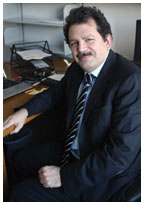
|
February 14, 2007: A moment with...
Chibli Mallat
Chibli Mallat (Frank Wojciechowski) |
Chibli Mallat, a leading Middle Eastern human rights lawyer and visiting senior research scholar at the Woodrow Wilson School, is running for president in Lebanon, which is scheduled to hold elections next fall. Information about his platform is available at mallatforpresident.com. A professor of law at Université Saint-Joseph in Beirut, Mallat helped found Indict, an organization dedicated to bringing former members of Saddam Hussein’s regime to trial on charges of crimes against humanity. He recently spoke with PAW’s Mark F. Bernstein ’83.
What policy should the United States pursue going forward in Iraq?
There have been a lot of suggestions from many quarters, and I think that is healthy. But there is a major flaw in that pursuit so far: Where are the Iraqis? You can’t do anything without the Iraqis. We need a commission similar to the Iraq Study Group that is bipartisan on the Iraq-U.S. side — an Iraqi-American commission. With a commission where the full spectrum of American and Iraqi leadership is represented, both the formation of the policy and its implementation become effective.
You pushed to prosecute Saddam Hussein, yet you have criticized his execution. Why?
My personal conviction is that the death penalty belongs to the pre-civilized age. In addition, standards of a fair trial generally failed in this trial, although the circumstances were uniquely difficult. The greatest mistake was not to hold the trial outside Iraq. Having it in Iraq led to all sorts of dangers. In addition to those executed, 13 people were killed over this trial. This is an unacceptable toll.
Hezbollah has established a strong presence in Lebanon. What is your position on this?
We need to take a frank position toward Hezbollah’s excesses. The war with Israel did not achieve anything but misery for Lebanon, and Hezbollah violated both international and Lebanese law in starting it and pursuing it unilaterally. Hezbollah needs to give up its weapons, and integrate as a normal party in the Lebanese system. At the moment, it is pursuing brinkmanship in the shape of a rampant coup. It’s not acceptable.
What is your view of the Syrian influence on Lebanon?
There is a heavy suspicion that the Syrians have assassinated our leaders, underlined by an ongoing international investigation. The Syrians say they had nothing to do with it. But they have been opposing the international tribunal that we are seeking to bring the perpetrators to justice, and they are simply not allowing Lebanon to follow its course of independence and democracy.
Given that, as you say, several Lebanese political leaders have been assassinated, do you fear for your own safety?
There has been a pattern of assassinations of Lebanese political leaders, including close colleagues and friends, politicians, journalists, public figures of all sorts. So there is concern. Being candid about it is the best protection.
Why are you running for the Lebanese presidency?
The main reason is that the leadership that the Cedar Revolution [of 2005, which sought the withdrawal of Syrian troops from Lebanon] has produced is not up to the expectations of the country. There’s a huge need for a different type of leadership throughout the Middle East. Lebanon is the one country that, because the nature of its revolution was nonviolent, could produce this leadership. It’s true that there is no one of Nelson Mandela’s caliber, or Gandhi’s, but our revolution in Lebanon deserves someone who at least seeks to approximate the model they offered.
What is your platform?
In terms of political reform, I have three main ideas. The first is that people should elect the top executive leaders directly. At the moment, members of parliament elect the president in Lebanon and frustrate a basic right that vests in the citizens. Second, Lebanon is a heavily sectarian country; only a Christian Maronite can run for president. Although I am a Christian Maronite, I want to reduce the sectarian inequality in the political system. The third important issue is to increase the participation of women in politics. The idea is to have at least a quarter of the cabinet composed of women.
Do you think you bring different qualities to the political arena because you are a professor?
In the sense that Woodrow Wilson did, of course. Of all American presidents,
he is the one I identify most with. I am a firm believer in the need for
leaders to write their own speeches, and Wilson’s Crossroads
to Freedom, the book of his campaign speeches of 1912, is a unique
political testimony. Deliver fewer speeches, but give quality to them
and think them through. ![]()

